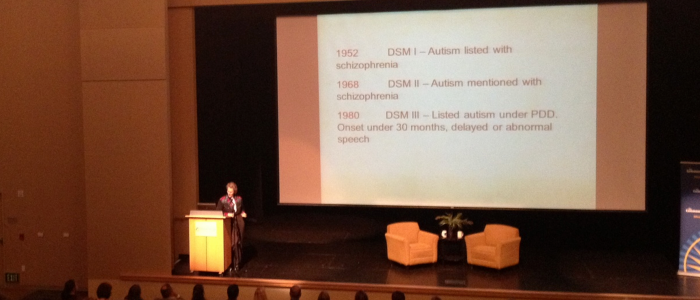Temple Grandin Speaks in Palo Alto!
And we were lucky enough to be there and get to listen to her!
Here are some of the notes we took, but before you take a look, check out Temple Grandin’s homepage here: http://templegrandin.com
–Playing with Sand: Grandin said she used to pour sand out of her hands as a child. Sound familiar to any parents? Grandin explained that the stimulus of the sand (visual and tangible,) made her feel calmer and that she was also examining every single grain of sand as it fell from her hands.
–NASA: Grandin showed a photograph from National television of some workers at NASA. She said one of the workers had hair like Elvis, and another looked like an ancient hippie. The fact that these guys were able to pull this hairstyle off on national television and in one of the most famous space stations in the world proved they were in “Asperger Heaven”.
–The Tablet Generation: Smartphones and tablets are the next tool for helping autistics be able to do anything. Her book, “The Autistic Brain” speaks about this in this expert. Check it out if you’re curious!: http://healthland.time.com/2013/05/19/excerpt-author-temple-grandin-reports-on-the-autistic-brain/
–Google Images in the Brain: Grandin explained that when she thinks, her brain works like Google Images. There are no words and she begins doing a speedy scan through her photos in her mind. Thus, it is hard to make associations between ideas. Such as if you say, “I’m going to the San Francisco Airport” there will be numerous connections to photos of other airports in the mind, but no connection to the fact of how to get there.
–Google Images in the Brain 2: Grandin continued on to explain that her mind never remembered or created vague images. Most people, when talking about a place they can’t really remember or don’t know, will create a vague image of a place in their mind, but Grandin explains that with her mind, that’s not the case.
–Speaking: If your child doesn’t speak by the time they are three, you need to be doing something to get the child to communicate with everyone.
–There are different minds. These minds learn differently. For example, there are minds that learn through auditory information, mathematical information, or even patterns. By knowing how your child learns and knowing their strengths, your child can have a much better chance at succeeding. Grandin explained she was allowed to work with a supercomputer along with Bill Gates only to find that computers was one of her weaknesses while Bill Gates had completely been mesmerized by the computer.
–Different Minds: Grandin said that she was able to visually simulate drawings. She explained this through using the Fukushima Nuclear Plant meltdown as an example. She explained that through visual simulation, there was a very simple problem with the Nuclear Plant that the mathematic creators never noticed and being a visual mind, she was able to notice. Thus, Grandin explained that we need to start getting different minded people to work together to cover for each other.
–Loud Noises: Autistic children hate being in loud areas such as supermarkets as they feel like they are in a speaker at a dance club. Grandin recommended one solution was to record loud sounds (crowds, markets, etc.) on a phone or recording device and let your child listen to it, starting from the lowest volume possible and raising it as the child gets used to it.
–Consonants: Grandin explained that consonants were hard to hear for children with autism. She recommended that enunciating the consonants would help the child be able to hear terms better.
-Seeing letters: Autistics see smaller letters than bigger letters.
–Work: If you explain what you want and when you want it, those with Aspergers can do any kind of work for you. Instead of saying, “Let’s make some software,” explain what you want that software to do and when do you want it by. Such as “Let’s make a software that can help children do simple addition with pictures. And let’s make it by April.” It’s all just on how you communicate it.
Some Interesting Questions:
Q. My son has Aspergers, but is he capable of love?
A. People with Aspergers are extremely loyal to those they trust.
Q. What are the effects of pets?
A. There three kinds of reactions to pets from kids with autism. There are those who like them and go near them. There are those who don’t like pets at first, but gradually get used to the pet as they continue to live together. Finally, there are kids who are terrified of the yipping, barking, meowing sounds that pets can make, and since they don’t want to make the animal use its voice, they avoid the pet at all costs.
Overall: Why do autistics have more trouble than we do?
Autistics need a mentor that can pull out their strengths and help them grow while understanding and respecting who they are.




Comments are closed.